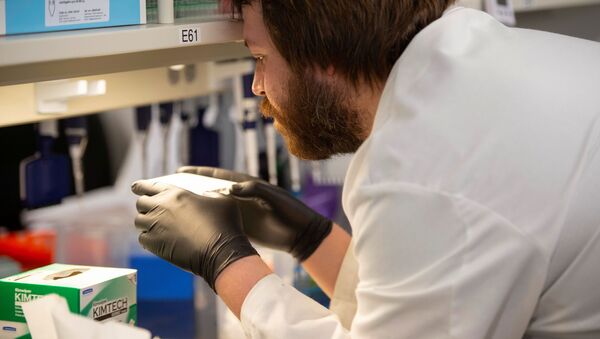An anti-malaria drug, once touted by US President Donald Trump as a viable treatment for the coronavirus (COVID-19), appears to offer no medical benefit and may even be dangerous for some people suffering from the virus, according to a new peer-reviewed study published in the medical journal The Lancet.
Dr Amit N Patel MD MS is an adjunct professor of biomedical engineering at the University of Utah and a co-author of the study which examined the use of hydroxychloroquine and chloroquine with and without antibiotics, for the treatment of COVID-19. His work looked at 96,032 patients in hospital registries, across 671 hospitals on six continents, who were hospitalised between 20 December 2019 and 14 April 2020 and who tested positive for COVID-19. Dr Patel specialises in innovation and pre-clinical research of novel biological and minimally invasive therapies for Lung and Heart Disease.
Sputnik: Explain, for a lay person, what exactly the key findings of your study are.
Dr Amit Patel: The key findings are that the use of hydroxychloroquine/chloroquine with or without antibiotics (i.e. azithromycin/clarithromycin) found no benefits in hospitalised COVID-19 positive patients.
There was [also] an increased chance of having an abnormal heart rhythm and death.
Sputnik: What is the difference between chloroquine and hydroxychloroquine and why did your study include the use of both drugs?
Dr Amit Patel: Chloroquine is the older medication known to have more complications. Hydroxychloroquine is the newer form with less complications. We included both in our study as we found that people were using both around the world.
Sputnik: Your report says that there is a 4.3 – 8.1% increased risk of COVID-19 patients taking either chloroquine or HCQ developing de-novo ventricular arrhythmia compared to those in the "control group" who only had a 0.3% increased risk of developing that condition.
What is de-novo ventricular arrhythmia and how serious, in your opinion, is this increased risk?
Dr Amit Patel: It means there is an increased risk of new abnormal heart beats and can be very serious in patients who [are] in the hospital with COVID-19 and who also may have other medical problems such as high blood pressure, cholesterol, heart failure, kidney failure, or who [are] older and/or overweight.
Sputnik: The US recently ordered 29 million doses of HCQ after the FDA loosened its process for the approval of the use of the drug. US President Donald Trump has also said that he is taking HCQ.
Was it a mistake to place an order for so much of this drug before its efficacy had been confirmed and should people avoid taking HCQ unless it is to treat malaria?
Dr Amit Patel: In the time of a pandemic many things are done to help as many people in the least amount of time.The key is you use the best information available at the time and then based on new information adjust and improve the response. At the time it was ordered, it was based on very preliminary studies in a very small number of patients which gave people hope.
Now, based on this this study, the use would not make sense in hospitals. However, the data is being collected on patients who are healthy and also people who are taking it to prevent the COVID-19 illness
Sputnik: Does this mean, that in your opinion, regulators should not be loosening standards to permit the use of unproven medicines? If not, why not?
Dr Amit Patel: They should not be loosening unproven medications without appropriate oversight. All medication should only be used under the guidance of a physician and under a clinical trial or registry to not only evaluate benefit but, most importantly, unknown harm.
Sputnik: What does it mean that the study was not "randomised" and why is it important that further randomised studies are completed on this matter?
Dr Amit Patel: Randomised trials mean that the intent to treat all patients was the same at the beginning of the study. Then after randomisation usually half get the treatment and half get the control [i.e. the placebo]. This helps to minimise bias.
This study had patients treated with HCQ/CQ/+/-ABX where their physician had the intent to use the drug and they did. The control were patients who did not receive the drug.
What we do not know is did their physician not want to use the medication or did they not know about it.


